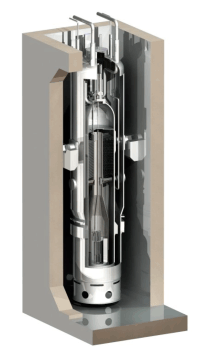forum
library
tutorial
contact

Why the Nuclear Energy
World is Thinking Small
by Jes Burns
Jefferson Public Radio, March 12, 2015
|
the film forum library tutorial contact |

|
Why the Nuclear Energy
by Jes Burns
|
 In the world of nuclear power, one technology is generating debate: factory-produced reactors that are no bigger than a house.
In the world of nuclear power, one technology is generating debate: factory-produced reactors that are no bigger than a house.
These "small modular reactors" are designed to produce power on the scale of a single factory or business campus. That's a big departure from a traditional nuclear plant -- the kind that's powerful enough to run an entire metropolis and big enough to be seen from miles away.
"Think of it as bite-sized power," said Mike McGough, chief commercial officer for NuScale Power, an Oregon-based company that's developing the first-of-its-kind small modular reactors. "Small modular reactors will play a critical role in the energy future of the country."
Advocates say small modular reactors represent a way to create jobs around an energy technology that doesn't emit carbon. Critics say it's an untested form of nuclear power that will add to the nation's stockpile of radioactive waste.
These arguments are bubbling up in Washington's state capitol. Lawmakers are considering a bill that aims to bring small modular reactors, or SMRs, to Washington. It would require the state Department of Commerce to look at siting and manufacturing the technology. The bill cleared the Republican-controlled Senate last week and now awaits action in the House, where Democrats hold the majority.
The legislation is sponsored by Sen. Sharon Brown, a Republican whose Mid-Columbia Basin district encompasses the Tri-Cities -- home to the region's only commercial nuclear power plant.
"We are well positioned to take the lead in this technology, but in our region, we risk being left behind, if we fail to coordinate our efforts to attract SMR production," she said.
NuScale Power is one of those places that comes to mind when Brown talks about her state falling behind in the development of small modular reactors. The company is building its first test facility in Corvallis, Oregon.
Ross Snuggerud, who manages the company's control room simulator, points out the safety features and computer software used to monitor the reactors.
These reactors are designed to be built with separate components so they can be scalable, Snuggerud said. They can also be dissembled and shipped in three large parts.
A group of 12 modules would generate enough power to take the place of a coal-fired power plant. He views small modular reactors as clean-energy alternatives.
"As a country we can start reaping the benefits of having a really dense, compact source of power that doesn't emit carbon dioxide," Snuggerud said.
Company officials say the technology could be used to back up intermittent renewable energy sources, like wind and solar power.
The public power agency Energy Northwest runs the region's only full-scale, commercial nuclear power plant, the Columbia Generating Station. The agency is working with NuScale to develop a reactor that, it says, should be up and running in 2023, likely in Idaho. Supporters of Brown's legislation would like to have a second small modular reactor in Washington.
That's a possibility, said Brad Sawatzke, the chief operating officer and chief nuclear officer for Energy Northwest.
"Our experience here will help us maybe lead the way with a small modular reactor, potentially somewhere in the Tri-Cities area," he said.
Sawatzke said small modular reactors are potentially more secure than full-scale plants. And unlike traditional nuclear reactors, those built with the modular design would allow the reactors to keep generating power during maintenance.
One option for the technology in Washington, Brown said, is to use a small modular reactor to power the vitrification plant at the Hanford Site, which, once completed, would bind Hanford's radioactive waste into glass.
A study from the Tri-City Development Council found that small modular reactors could save 40,000 gallons of diesel fuel a day to be used at the plant.
Small modular reactor advocates would also like to start a manufacturing plant in Richland, where the reactors would be able to be shipped around the world.
Not everyone wants to see small modular reactors coming to Northwest.
Chuck Johnson, the director of the joint task force on nuclear power for the Oregon and Washington Physicians for Social Responsibility, said he worries about NuScale's design because it is so far untested. He said it's premature for the Legislature to consider the technology.
"Even though it is speculative, because it's the only small modular reactor program still going in the United States, we consider it to be really important. We would like to stop it before it gets started," Johnson said.
The group has come out against Brown's small-scale nuclear energy bill heading through the Washington Legislature.
Johnson said small modular reactors would create more nuclear waste -- that we can't get rid of.
"Inherently because of the waste that generates, it should not be considered a renewable energy source," Johnson said. "That wasn't the intention of Washington voters."
learn more on topics covered in the film
see the video
read the script
learn the songs
discussion forum
